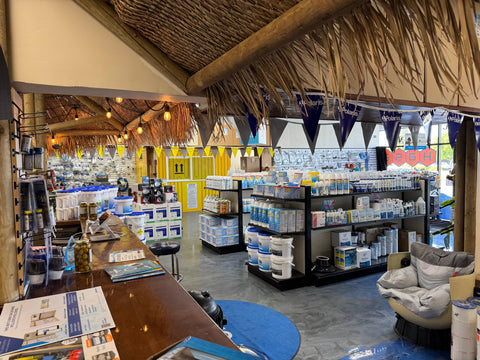Keeping your swimming pool clean, clear, and safe starts with one essential component — your pool filter. A reliable filtration system quietly removes debris, algae, and microscopic particles before they cause problems. But even the most durable filter has an expiration date.
In this guide, you’ll learn how long pool filters last, what factors shorten their lifespan, and the best ways to make yours last longer — helping you save money and enjoy sparkling water year-round.
Table of Contents
- Types of Pool Filters & Average Lifespans
- Sand Pool Filters
- Cartridge Pool Filters
- Diatomaceous Earth (DE) Filters
- Factors That Affect Pool Filter Longevity
- Warning Signs It’s Time to Replace Your Filter
- Tips to Extend Your Pool Filter’s Lifespan
- Frequently Asked Questions
Types of Pool Filters & Average Lifespans
The average pool filter lifespan ranges from 2 to 10 years, depending on the type, maintenance schedule, and environmental conditions. Each system offers unique strengths and replacement timelines. For replacement parts, see our Pool Filter Parts collection.
Sand Pool Filters
Average lifespan:
- Media (sand or glass): 7–10 years
- Tank: Up to 20 years with proper maintenance
Sand filters remain a favorite among pool owners for their simplicity and durability. They use fine sand or glass beads to capture impurities as water circulates.
Backwashing every few weeks helps clear trapped debris and keeps the filter efficient. When maintained correctly, sand filter tanks can easily last two decades.
👉 Shop Multiport Valves
Cartridge Pool Filters
Average lifespan:
- Cartridge element: 2–3 years
- Housing unit: 5–10 years
Cartridge filters are known for high efficiency and water conservation. Instead of backwashing, you remove the pleated cartridge and rinse it with a hose.
Over time, pleats flatten or tear — a clear sign it’s time for replacement. Clean the cartridge regularly and deep clean every few months to extend its life.
👉 Shop Cartridge Filters | Replacement Cartridges | Filter Cleaners
Diatomaceous Earth (DE) Filters
Average lifespan:
- Filter grids: Up to 5 years
DE filters offer the finest filtration quality — capturing particles as small as 2–5 microns. They deliver unmatched water clarity but require more frequent cleaning and re-coating with DE powder.
Monthly backwashing and quarterly deep cleans keep the system performing at its best.
👉 Shop DE Filters | DE Grids | DE Powder
Factors That Affect Pool Filter Longevity
Even with ideal conditions, several key variables determine how long your pool filter lasts. For troubleshooting parts (o-rings, gauges, laterals), see Pool Filter Parts.
1. Water Chemistry
Imbalanced pH or excessive chlorine can corrode internal components. Routine water testing and adjustments prevent chemical damage and buildup.
2. Pool Size and Usage
Large or frequently used pools strain the filter more. Heavy swimmer load means more debris and oils for your system to process, leading to faster wear.
3. Maintenance Habits
Consistent cleaning, backwashing, and timely media changes can double a filter’s lifespan compared to one that’s neglected. Stock up on filter cleaners to keep maintenance on track.
4. Environmental Conditions
Sun exposure, dust, and organic debris all contribute to filter degradation. Protect your system during storms and extreme temperatures whenever possible.
Warning Signs It’s Time to Replace Your Filter
When your pool filter reaches the end of its life, you’ll notice these telltale symptoms:
- Sluggish water flow or uneven circulation
- Cloudy, green, or hazy water
- Irregular pressure readings
- Higher chemical demand
- Frayed or torn filter material
- Filter media leaking back into the pool
If multiple signs appear, replacing the filter or its components is the most cost-effective solution. Start with new cartridges, DE grids, or fresh media as needed.
Tips to Extend Your Pool Filter’s Lifespan
Replacing a filter can be costly, but these smart maintenance habits can add years of service:
Run Your Filter Efficiently
Follow manufacturer guidelines for daily runtime and speed. Overworking your pump leads to faster deterioration.
Inspect Regularly
Monthly checks catch damage early. Look for crushed cartridges, compacted sand, or worn DE grids. Keep common replacement parts on hand.
Keep Skimmers and Baskets Clear
Debris buildup forces the filter to work harder. Clean skimmers after storms or heavy leaf fall to maintain steady flow.
Stick to a Cleaning Schedule
- Sand filters: Backwash every 4–6 weeks.
- Cartridge filters: Rinse weekly or monthly; deep clean quarterly.
- DE filters: Backwash monthly and rebuild every 3 months.
A steady maintenance routine keeps your pool clear and your filter healthy.
Frequently Asked Questions
How often should I clean my pool filter?
It depends on the type. Sand filters need cleaning every few weeks, cartridge filters should be rinsed regularly, and DE filters require monthly maintenance plus quarterly rebuilds. See filter cleaners.
When do I replace the media versus the whole filter?
If your tank or housing is intact, media replacement usually restores performance. Replace the entire unit if there are cracks, leaks, or severe performance loss. Browse complete filters or replacement parts.
Does frequent cleaning really help filters last longer?
Yes. Regular cleaning prevents clogging and pressure buildup — two major causes of premature failure. Use approved cleaners and follow label directions.
Keep Your Pool Filter Performing Like New
Your pool filter is the foundation of healthy water. By keeping up with cleaning, monitoring water chemistry, and replacing parts when needed, you can enjoy crystal-clear water for years to come.
Explore high-quality sand, cartridge, and DE filters at Benchmark Pool Supply to keep your pool running at its best.




